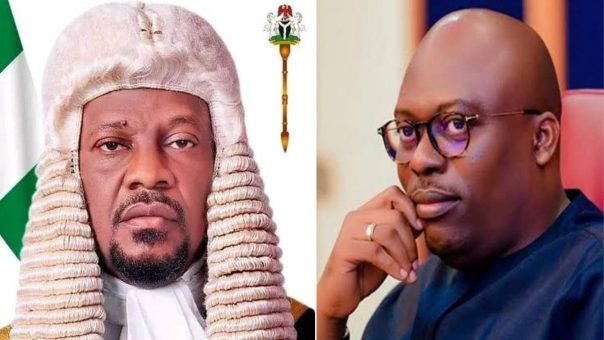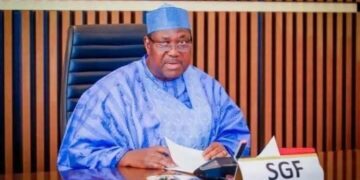The Supreme Court on Monday dismissed an appeal filed by Governor Siminalaye Fubara, challenging the Court of Appeal’s ruling that recognized Hon. Martin Amaewhule as the legitimate Speaker of the Rivers State Assembly.
A five-member panel of the apex court, led by Justice Uwani Abba-Aji, dismissed the appeal (SC/CV/1071/2024) after it was withdrawn. Although the case was scheduled for hearing, Governor Fubara’s legal team, headed by Mr. Yusuf Ali, SAN, announced the withdrawal when the case was called. Ali explained that the decision was made because the matter had become irrelevant due to evolving circumstances.
While Chief Wole Olanipekun, SAN, representing the Amaewhule-led lawmakers, did not object to the withdrawal, he requested the court to impose a cost. Similarly, Mr. J.B. Daudu, who represented the 3rd to 12th defendants, also requested costs, though he did not oppose the withdrawal. The defendants urged the court to dismiss the appeal rather than strike it out, citing that they had already exchanged legal documents with the appellant.
In its ruling, the panel led by Justice Abba-Aji dismissed the appeal and imposed a N4 million cost on Governor Fubara.
It should be noted that the Court of Appeal in Abuja had, on October 10, 2024, issued a unanimous ruling affirming the legitimacy of the Amaewhule-led members of the Rivers State Assembly. A three-judge panel, led by Justice Joseph Oyewole, dismissed Fubara’s appeal and upheld the Federal High Court’s decision from January 22, 2024, which annulled the 2024 Rivers State budget because it was not presented to lawmakers who were legally recognized.
The appellate court criticized Fubara for undermining his position when he voluntarily withdrew a counter-affidavit he had filed to contest the Amaewhule-led lawmakers’ legal action for recognition as valid members of the Rivers State House of Assembly.
The court held that Governor Fubara’s decision to present the 2024 Rivers State Appropriation Bill to only four out of 31 members of the Assembly amounted to a gross violation of section 91 of the 1999 Constitution, as amended, and an act of “executive recklessness.”
The appellate court held that the absence of any document from Fubara to contradict all the claims the Amaewhule-led lawmakers made in their suit meant that he admitted all the facts they stated in the matter.
It accused Fubara of surreptitiously attempting to set aside orders of the trial court through the appeal, saying the mistake he made by withdrawing his counter-affidavit to the originating suit could not be redeemed by brilliant advocacy.
Maintaining that Fubara’s loss was “self-inflicted,” the appellate court held that since the counter-affidavit was withdrawn, “the Appellant is deemed to have admitted the rather weighty facts that were presented by the Respondents.”
It will be recalled that the Rivers State Assembly was fractionalised owing to the frosty relationship between Governor Fubara and his predecessor and Minister of the Federal Capital Territory, FCT, Nyesom Wike.
In the heat of the fracas, Governor Fubara sidelined the Amaewhule-led 26 members of the House that were loyal to Wike and presented the state’s N800 billion 2024 budget before the four lawmakers led by Hon. Edison Ehie, who had emerged as a factional Speaker of the Assembly.
The Ehie-led faction, which had also declared seats of the Amaewhule-led pro-Wike lawmakers vacant for defecting to the All Progressives Congress (APC) from the Peoples Democratic Party, promptly passed the budget, which was quickly assented to by Governor Fubara.
Meanwhile, following the intervention of President Bola Tinubu, both Fubara and Wike signed a peace pact that included the restoration of Amaewhule as the bona fide Speaker of the State Assembly.
The factional Speaker, Ehie, who had approached the court and was joined as an interested party in the suit, subsequently withdrew all the processes he filed before the court and equally rescinded both his seat and his membership in the Assembly.
While Governor Fubara, in line with the terms of the peace deal, also withdrew all the processes he filed to challenge the suit, the pro-Wike lawmakers only withdrew an impeachment notice they served on him while they declined to terminate their legal action.
While deciding the suit, Justice James Omotosho of the high court held that the budget was invalid as it was not properly presented before the Rivers State House of Assembly as required by the law.
He held that Governor Fubara acted like a tyrant when he demolished the Rivers State Assembly complex and withheld funds standing to the credit of the legislative house.
The court also described as unconstitutional the redeployment of the clerk and deputy clerk of the Rivers State Assembly by Governor Fubara.
Justice Omotosho stressed that the governor lacked the statutory rights to interfere with the operations of the Assembly, adding that he acted in contempt of a subsisting order that barred the parties from taking any steps to overreach the matter that was pending before the court.
Besides, the court held that National Assembly could not take over the legislative affairs of the state in the absence of the preconditions that were listed under section 11 of the 1999 Constitution, as amended.
Therefore, the court, among other things, nullified all actions the Rivers Assembly took without the participation of the Amaewhule-led members of the House, among which included the presentation of the state’s appropriation bill.
It issued an order of injunction, restraining Governor Fubara from impeding or frustrating the operations of the Assembly under Amaewhule’s leadership as its speaker.
It ordered the governor to release all funds standing to the credit of the Rivers State House of Assembly.
While upholding the verdict of the lower court, the appellate court held that Fubara conceded to the Amaewhule-led lawmakers when he withdrew all the processes he filed against their suit.
It held that the orders of the trial court were appropriate in view of the circumstance of the case, saying the appeal Fubara filed before it amounted to an academic exercise.
Accordingly, it ordered Fubara to pay a cost of N500,000 to each of the Respondents in the appeal marked CA/ABJ/CV/133/2024.

Address: No 5 Ejembi Eko Street, New GRA, Makurdi, Benue State, Nigeria






